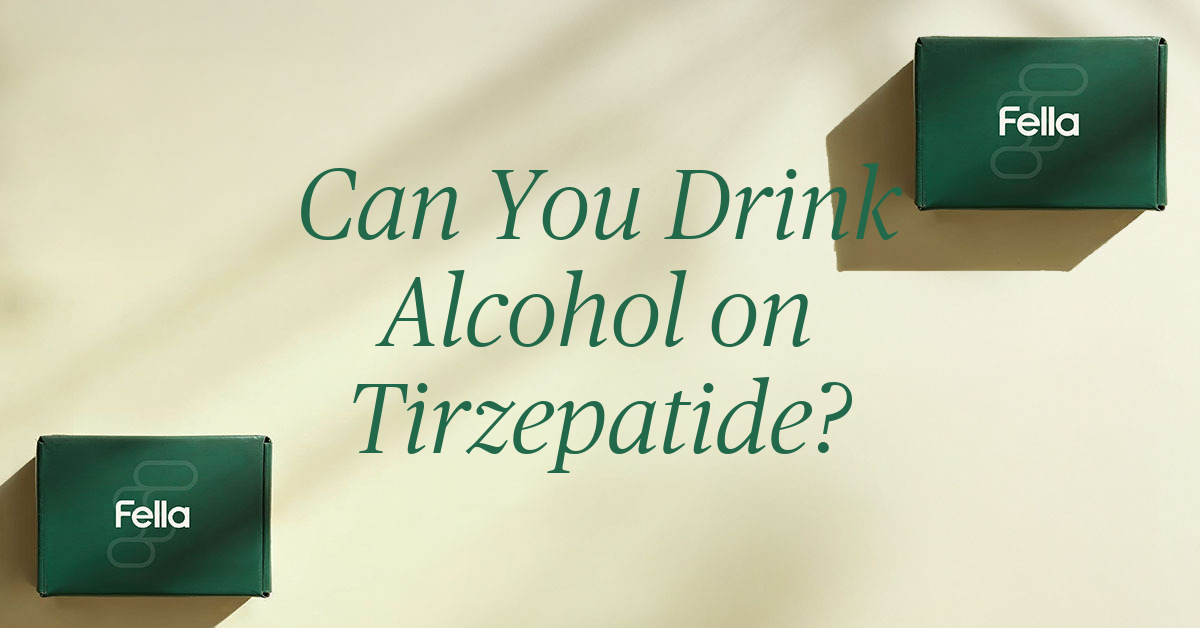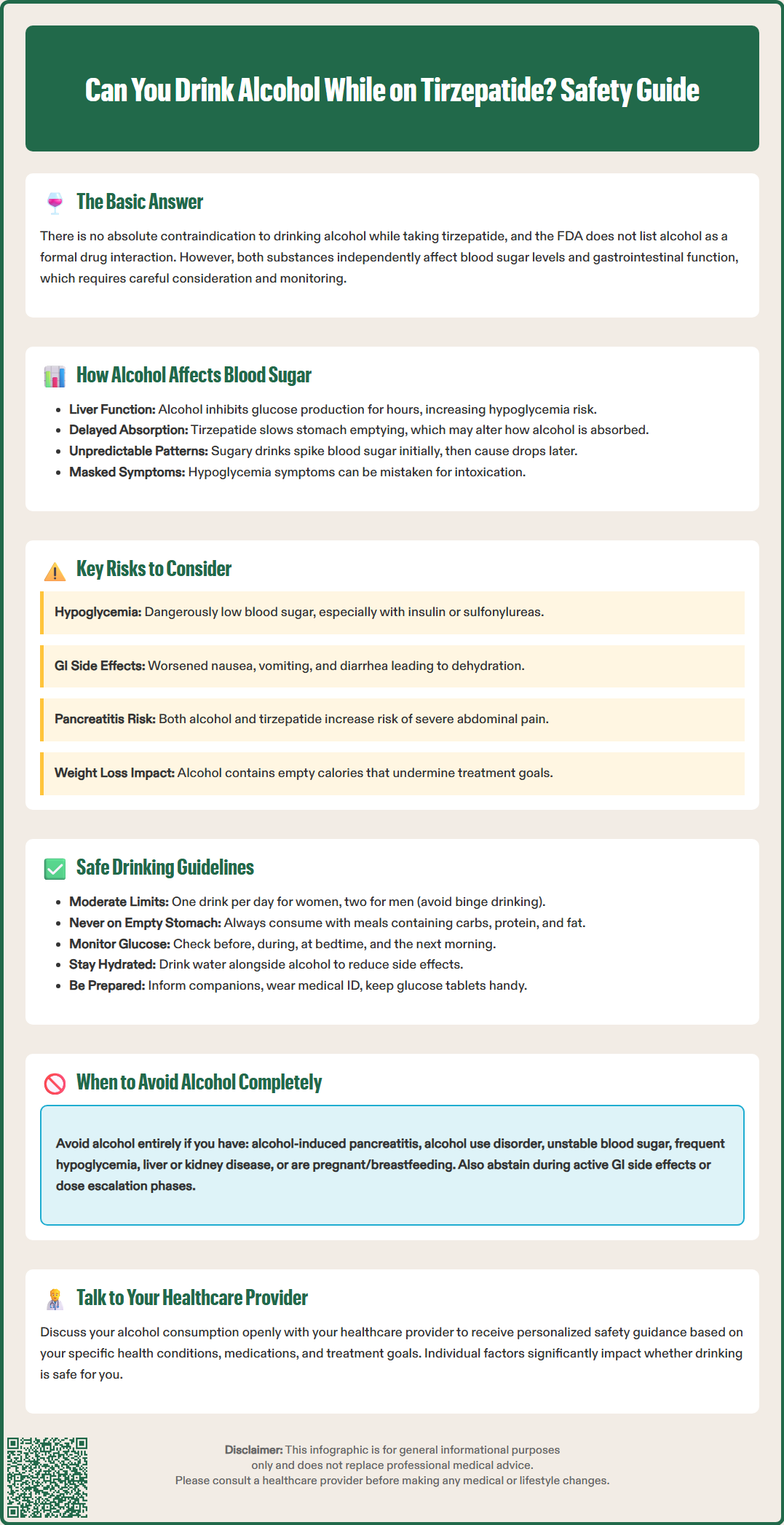LOSE WEIGHT WITH MEDICAL SUPPORT — BUILT FOR MEN
- Your personalised programme is built around medical care, not willpower.
- No generic diets. No guesswork.
- Just science-backed results and expert support.
Find out if you’re eligible

Tirzepatide (Mounjaro, Zepbound) is a dual GIP and GLP-1 receptor agonist approved for type 2 diabetes and chronic weight management. While the FDA label does not list alcohol as a contraindication, combining alcohol with tirzepatide requires careful consideration. Both substances affect blood glucose regulation and gastrointestinal function, creating potential risks including hypoglycemia, worsened side effects, and impaired treatment outcomes. Patients should discuss their alcohol consumption with their healthcare provider to receive personalized guidance based on their medical history, concurrent medications, and treatment goals for safe and effective tirzepatide therapy.
Quick Answer: You can drink alcohol while taking tirzepatide, but it requires caution due to risks of hypoglycemia, worsened gastrointestinal side effects, and potential interference with treatment goals.
There is no absolute contraindication to consuming alcohol while taking tirzepatide (Mounjaro, Zepbound), and the FDA-approved prescribing information does not list alcohol as a formal drug interaction. However, this does not mean alcohol consumption is without risk for patients using this medication. Tirzepatide is a dual glucose-dependent insulinotropic polypeptide (GIP) and glucagon-like peptide-1 (GLP-1) receptor agonist approved for type 2 diabetes management and chronic weight management in adults with obesity or overweight with weight-related comorbidities.
The absence of a direct pharmacokinetic interaction does not eliminate physiological concerns. Both tirzepatide and alcohol independently affect blood glucose regulation, gastrointestinal function, and metabolic processes. Patients with type 2 diabetes face particular risks when combining alcohol with glucose-lowering medications, including hypoglycemia and impaired counter-regulatory responses. Additionally, tirzepatide's mechanism of slowing gastric emptying (an effect that is most pronounced initially and tends to diminish with continued treatment) may influence alcohol absorption.
Clinical judgment should guide individual recommendations. The American Diabetes Association advises that adults with diabetes who choose to drink should do so in moderation and with awareness of potential complications. Patients should discuss their alcohol consumption habits openly with their healthcare provider to receive personalized guidance based on their medical history, concurrent medications, glycemic control, and treatment goals. This conversation is essential for optimizing both safety and therapeutic outcomes while on tirzepatide therapy.

Alcohol exerts complex and sometimes contradictory effects on glucose metabolism that can complicate diabetes management. Ethanol inhibits hepatic gluconeogenesis, the liver's production of glucose from non-carbohydrate sources, which normally helps maintain blood sugar levels between meals and overnight. This inhibition can persist for hours after alcohol consumption, increasing the risk of delayed hypoglycemia, particularly when drinking occurs without adequate food intake. For patients taking tirzepatide, which enhances insulin secretion in a glucose-dependent manner, this risk requires careful consideration.
Tirzepatide slows gastric emptying as part of its mechanism of action, which contributes to improved glycemic control and promotes satiety. This delayed gastric emptying could theoretically affect alcohol absorption, though no formal pharmacokinetic studies have specifically examined this interaction. Patients should be aware that symptoms of hypoglycemia (confusion, dizziness, sweating) can mimic alcohol intoxication, potentially delaying recognition and treatment.
Alcoholic beverages also vary significantly in carbohydrate content. Beer, sweet wines, and mixed drinks with sugary mixers can cause initial hyperglycemia, followed by reactive hypoglycemia as insulin response and hepatic glucose suppression take effect. Conversely, spirits and dry wines contain minimal carbohydrates but still suppress gluconeogenesis. This biphasic effect makes blood glucose prediction challenging. Patients using continuous glucose monitors may observe unexpected glycemic variability following alcohol consumption, necessitating more frequent monitoring and potential adjustment of diabetes management strategies during and after drinking occasions. The American Diabetes Association recommends monitoring blood glucose before, during, and after alcohol consumption, including overnight monitoring due to the risk of delayed hypoglycemia.
The most significant clinical risk of combining alcohol with tirzepatide is hypoglycemia, particularly in patients with type 2 diabetes who are also taking insulin or sulfonylureas. While tirzepatide alone carries a lower intrinsic hypoglycemia risk compared to these agents due to its glucose-dependent mechanism, alcohol's suppression of hepatic glucose production can precipitate dangerous blood sugar drops. Patients taking tirzepatide with insulin or sulfonylureas should be especially cautious and may need medication dose adjustments when consuming alcohol. Severe hypoglycemia may result in loss of consciousness, seizures, or cardiovascular events, and the symptoms can be masked or attributed to intoxication, delaying appropriate treatment.
Gastrointestinal adverse effects represent another important concern. Tirzepatide commonly causes nausea, vomiting, diarrhea, constipation, and abdominal discomfort, especially during dose escalation. According to the FDA prescribing information, these effects occur in up to 30-40% of patients, with rates varying by dose. Alcohol is a gastric irritant that can independently cause nausea, vomiting, gastritis, and diarrhea. The combination may result in additive or synergistic gastrointestinal distress, potentially severe enough to cause dehydration, electrolyte disturbances, or medication non-adherence. Patients who experience significant nausea from tirzepatide should be particularly cautious about alcohol consumption.
Pancreatitis, though rare, has been reported with GLP-1 receptor agonists including tirzepatide. Chronic heavy alcohol use is an established independent risk factor for both acute and chronic pancreatitis. Patients should be instructed to stop tirzepatide immediately and seek urgent medical care if they develop severe, persistent abdominal pain (with or without vomiting) that could indicate pancreatitis. Additionally, tirzepatide carries an FDA warning about acute gallbladder disease, which can present with similar abdominal symptoms. Alcohol provides empty calories (approximately 7 kcal/g) that can undermine weight management goals in patients using tirzepatide for obesity treatment. Regular alcohol consumption may significantly impair the medication's effectiveness for weight loss and metabolic improvement, representing a substantial opportunity cost for patients investing in this therapy.
For patients with type 2 diabetes taking tirzepatide who choose to consume alcohol, adherence to evidence-based moderation guidelines is essential. The American Diabetes Association defines moderate alcohol consumption as up to one drink per day for women and up to two drinks per day for men. One standard drink contains approximately 14 grams of pure alcohol: 12 ounces of regular beer (5% alcohol), 5 ounces of wine (12% alcohol), or 1.5 ounces of distilled spirits (40% alcohol). These limits should be considered maximum thresholds rather than recommendations, and lower consumption is generally safer.
Alcohol should never be consumed on an empty stomach when taking tirzepatide or other diabetes medications. Food intake stimulates insulin secretion and provides glucose substrate, helping to prevent hypoglycemia. Patients should consume alcohol with or shortly after a meal containing carbohydrates, protein, and fat. Choosing lower-carbohydrate alcoholic beverages (light beer, dry wine, spirits with sugar-free mixers) may help minimize glycemic excursions, though this does not eliminate hypoglycemia risk. Avoiding binge drinking (defined as four or more drinks for women, five or more for men, within approximately two hours) is critical, as this pattern dramatically increases all alcohol-related risks.
Blood glucose monitoring becomes particularly important around alcohol consumption. Patients should check blood sugar before drinking, periodically during extended drinking occasions, before bed, and upon waking the following morning, as delayed hypoglycemia can occur up to 24 hours after alcohol intake. A carbohydrate-containing bedtime snack after drinking may help reduce overnight hypoglycemia risk. Patients taking insulin or sulfonylureas along with tirzepatide should discuss possible dose adjustments with their healthcare provider before drinking alcohol. Wearing medical identification indicating diabetes status is advisable when drinking in social settings. Patients should inform at least one companion about their diabetes and how to recognize and respond to hypoglycemia. Having fast-acting carbohydrate sources readily available (glucose tablets, juice) is a prudent safety measure. Finally, patients should maintain adequate hydration with water or non-caloric beverages alongside any alcohol consumption to minimize dehydration risk and gastrointestinal side effects.
Certain clinical situations warrant complete alcohol abstinence for patients taking tirzepatide. A history of alcohol-induced pancreatitis represents an absolute indication to avoid alcohol. For pancreatitis from other causes, individualized medical advice is needed, but extreme caution with alcohol is warranted given the potential association between GLP-1 receptor agonists and pancreatitis risk. Patients experiencing severe, persistent abdominal pain (with or without vomiting) should stop tirzepatide immediately and seek urgent medical evaluation to rule out pancreatitis. Patients with a history of alcohol use disorder should also abstain, as even small amounts may trigger relapse, and the metabolic complications of resumed heavy drinking would be particularly detrimental in the context of diabetes or obesity management.
Patients experiencing significant gastrointestinal side effects from tirzepatide should avoid alcohol until these symptoms resolve. This includes persistent nausea, recurrent vomiting, severe abdominal pain, or diarrhea. Adding alcohol to an already compromised gastrointestinal state risks dehydration, electrolyte imbalances, and potential medication discontinuation. Similarly, during the dose escalation phase of tirzepatide therapy, when gastrointestinal adverse effects are most common, temporary alcohol avoidance may be prudent until tolerance is established at the maintenance dose.
Patients with poor glycemic control, frequent hypoglycemic episodes, or hypoglycemia unawareness should not consume alcohol until these issues are addressed and stabilized. The added unpredictability of alcohol's effects on glucose metabolism is unacceptable in these high-risk situations. Additionally, patients taking multiple glucose-lowering medications, particularly insulin or sulfonylureas in combination with tirzepatide, face substantially elevated hypoglycemia risk and should discuss alcohol consumption very carefully with their healthcare provider—many may be advised to abstain entirely.
Tirzepatide is not recommended during pregnancy and should be discontinued if pregnancy is recognized. Alcohol should be avoided during pregnancy due to risks of fetal alcohol spectrum disorders. Regarding breastfeeding, the CDC advises that not drinking alcohol is the safest option; however, if a nursing mother chooses to drink, she should limit consumption and time feedings (waiting at least 2 hours per standard drink before nursing). Patients with advanced liver disease, severe kidney disease, hypertriglyceridemia, or cardiovascular conditions should consult their healthcare provider before any alcohol consumption, as these conditions may be worsened by alcohol independently of tirzepatide considerations. When in doubt, patients should seek individualized medical advice rather than making assumptions about alcohol safety.
There is no direct pharmacokinetic drug interaction between alcohol and tirzepatide listed in FDA prescribing information. However, both substances independently affect blood glucose regulation and gastrointestinal function, creating physiological risks that require clinical consideration.
The most significant risk is hypoglycemia, especially for patients also taking insulin or sulfonylureas. Alcohol suppresses the liver's glucose production, which can cause dangerous blood sugar drops that may be mistaken for intoxication, delaying appropriate treatment.
Temporary alcohol avoidance during dose escalation may be prudent, as gastrointestinal side effects are most common during this phase. Patients with pancreatitis history, alcohol use disorder, poor glycemic control, or frequent hypoglycemia should avoid alcohol entirely and consult their healthcare provider.
All medical content on this blog is created using reputable, evidence-based sources and is regularly reviewed for accuracy and relevance. While we strive to keep our content current with the latest research and clinical guidelines, it is intended for general informational purposes only.
This content is not a substitute for professional medical advice, diagnosis, or treatment. Always consult a licensed healthcare provider with any medical questions or concerns. Use of this information is at your own risk, and we are not liable for any outcomes resulting from its use.